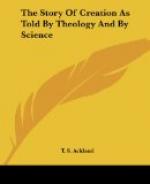But something is also required of the opposite party. At the very threshold of the investigation they must be asked to lay aside, so far as is possible, those prejudices against the Bible which have naturally arisen in their minds from the obstinacy with which views, which they knew to be untenable, have been forced upon their acceptance as the undoubted teaching of God, so that they may enter upon the investigation with unbiassed minds. Then they must be careful to distinguish between established facts, and theories however probable. There is something very fascinating in a well constructed theory. Theories have again and again done such good service in opening the way, first, to the discovery, and then to the arrangement of facts, that we are very apt to assign to them an authority far beyond that to which they are really entitled. When, for instance, we have ascertained that a certain number of facts are explained by some particular theory, we are apt to assume prematurely, that the same theory must account for and be in harmony with all similar and related facts; or, if we have satisfied ourselves that certain results may have been produced in a particular way, we are in great danger of being led to conclude that they must have happened in that way. No mere theory can have any weight against a statement resting on solid evidence, but where the evidence is weak, or, what is practically the same thing, where the knowledge of that evidence is defective, a probable theory must carry great weight in influencing our judgment. Care must therefore be taken to keep theories in their proper place. Where we have to deal with well-established facts, any interpretations to which those facts may lead us may be taken as also established, but interpretations which are suggested by theories only must be regarded as provisional, and liable to future modification or rejection, as our knowledge increases.
The Mosaic Record itself, when carefully examined, seems to be peculiarly open to the process suggested. No doubt there is yet much work for Philology to do in its interpretation [Footnote: Such words, for instance, as [Hebrew script:],[Hebrew script:], [Hebrew script], used of different creative acts, may imply some difference of which we are ignorant. So again the uses of the words [Hebrew script], [Hebrew script:], and [Hebrew script:] for “man,” may have a bearing on some of those questions which now seem most perplexing.], but one thing seems certain—there is in it an absence of all detail. The facts to which it has reference are stated in the briefest and most simple manner, without the slightest reference to the means by which they were effected, or, apart from the question of the days, the time which was occupied in their accomplishment. When stripped of all that is traditional, and examined strictly by itself, the narrative seems greatly to resemble one of those outline maps which are supplied to children who are




